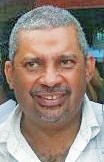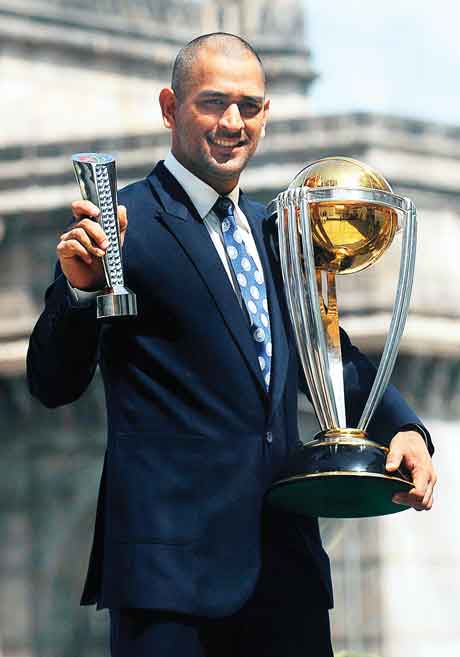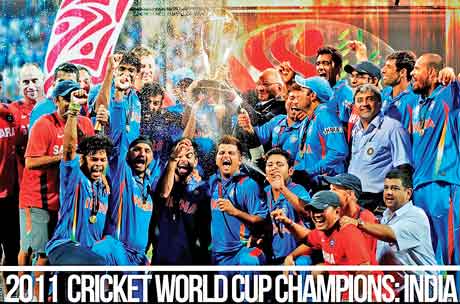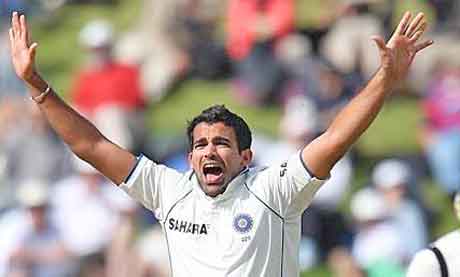April 6, 2011 issue
Cricket
World Cup winners

Tony McWatt
From the outset I had identified India as one of the favorites to win the trophy. I have to admit though that I had also believed in South Africa's
possession of the necessary requirements to go all the way.
So what were the secrets of India's eventual success? To start, a wonderful team chemistry and cohesiveness, accentuated by superlative captaincy from Mahendra Singh Dhoni. He not only found a way to get the best out of his players, but when it mattered most, also decisively lead from the front. At a crucial moment in the final, he promoted himself in the batting order and then featured in a 109 run partnership with Gautam Gambhir that all but saw his team home to victory.
The measure of Dhoni's superlative leadership is evidenced by the comments of Sachin Tendulkar, indisputably India's greatest batsman and most famous cricketer ever:
"He [Dhoni] is the best captain I have played under," Tendulkar said in Mumbai after the Final. "He is very sharp and always alert. He reads the situation well and is open to sharing ideas. He always has discussions with bowlers, batsmen and senior players separately…He is always calm and never shows his frustration. These are some of the human qualities which have made him such a good captain. He is a fantastic captain!"
Throughout the tourney India also repeatedly demonstrated some of the resourcefulness that had characterized Australia's run of three successive Championship wins in 1999, 2003 and 2007. Whenever it mattered most, someone in the team stuck their hand up and performed in a manner necessary to produce the desired results. Gambhir's innings of 97 in the Final was crucial to India's victory, especially after the early losses of the team's two top batsmen, Virender Sehwag and Tendulkar with only thirty-one runs on the board. It was only one of many examples of vital individual performances from members of the team. A lesser resourceful and self believing team might have easily succumbed at that stage of such an all-important occasion.

What India also did, arguably better than any others, was to learn from the errors made in their previous matches. Their tie against England provided valuable lessons on how to better restrict their opposition from scoring. Lessons that came in handy in allowing them to limit the powerful Sri Lanka batting to a Final total that eventually proved to be well within their reach.
Similarly, the Preliminary Round loss to South Africa provided the painful lessons of the embarrassment of a middle order collapse that was as monumental as it was stunning. From the relative security of 267-2 in the 39th over, India lost its remaining eight wickets for the addition of only 29 runs during the next ten very dramatic overs. The lesson learnt from that embarrassment was for the team to not be over reliant on Sehwag and Tendulkar.
So twenty-eight years after they shocked the cricketing world with their unanticipated 1983 triumph over Clive Lloyd's all-conquering West Indies, India are World Champions again. The leadership parallels between the two Indian teams, then and now, are highly noticeable.
India's '83 triumph was a direct result of skipper Kapil Dev's superb marshalling of his unheralded bowling attack. Mohinder Armanath and Madan Lal, two bowlers who under normal circumstances would be highly unlikely to strike terror in the hearts of any batsman - let alone the likes of Vivian Richards, Clive Lloyd, Gordon Greenidge, Desmond Haynes and Jeffrey Dujon - were the heroes of India's shocking triumph.
But what of the West Indies performances during this World Cup? Fairly impressive victories over Bangladesh, Irelands and the Netherlands allowed them to regain the 8th position in the One Day International Rankings they had previously surrendered to Bangladesh. Against their fellow Test playing countries, South Africa, England and India however, they faltered badly and were embarrassingly humiliated by Pakistan in the quarter-finals.
Still there were some positives to be gleaned from the exercise, notwithstanding how disappointingly it ended. Kemar Roach was one of the Tournament's top wicket-takers, impressing everyone with his pace and control. Keiron Pollard's power hitting was at times highly entertaining, while Davendra Bishoo and Andre Russel both identified themselves as very bright and exciting prospects for the future.
The West Indies weakest link was their captain Darren Sammy. Clueless at times in his tactics, he made matters far worse by abjectly failing to meet the bare standards of performance that would have justified his position on the team. In the end his inclusion in the lineup for the semi-final may have cost the West Indies the game, as it was at the exclusion of Andre Russell who had taken four wickets and scored an attractive 49 in the match prior.
As I'd said repeatedly before in this column, one of the fundamental requirements of captaincy is the ability to justify a position on the team, beyond debate. It should have been evident to anyone with two eyes and half a cricket brain that either as a bowler or batsman, Sammy simply does not posses the talent required to do so.
It will be another four years until the next World Cup is held. The hosts will be Australia and New Zealand. The intervening years should provide the West Indies with sufficient time to build a team capable of mounting a worthy challenge for the Championship's highest honors.
The likes of Adrian Barath, the Bravo brothers Dwayne and Darren, Pollard, Roach, Bishoo and Russell will all be four years older and hopefully will have reached the level of maturity required of outstandingly successful cricketers. Marlon Samuels, Jerome Taylor and Fidel Edwards are others who are still young enough to be playing at that time. Providing of course that they can maintain not only their fitness, but also the interest in meeting the requirements of performance at that level.
As for India, they have four years to enjoy their second taste of World Cup victory. It couldn't have happened to a nicer team!
glory comes to a cricket crazed nation

India beat Sri Lanka by six wickets in a pulsating final to deliver World Cup glory to their cricket-mad population for the first time since 1983.
Sri Lanka smashed 91 from their last 10 overs to post 274-6 in Mumbai, with Mahela Jayawardene making a superb 103.
India lost Virender Sehwag and Sachin Tendulkar early on but Gautam Gambhir and Mahendra Dhoni rebuilt the innings.
Gambhir was out for 97, but captain Dhoni's brilliant unbeaten 91 led India to a famous win with 10 balls to spare.
The skipper, struggling for form throughout the tournament, played the innings of his life and sealed the victory with a phenomenal straight six that sailed high into the stands, providing the catalyst for euphoric celebrations in the Wankhede Stadium.
Tendulkar's early dismissal for 18 ensured there was to be no fairytale 100th international century for Mumbai's favourite son.
But wonderful innings from Gambhir and Dhoni ensured the "Little Master" can finally get his hands on the sport's ultimate prize at the sixth attempt as India became the first host nation to win the tournament, while Jayawardene became the first player to score a hundred in the final and finish on the losing side.
Meanwhile, it was a sad end to the incredible career of Sri Lanka off-spinner Muttiah Muralitharan who, having battled injuries throughout the event, failed to take a wicket in his last international match.
And when the Sri Lankan inquest begins, they will surely regret the decision to make four changes for the final, only one of which was enforced.
With off-spinner Ajantha Mendis dropped, replacement bowlers Thisara Perera, Nuwan Kulasekara and Suraj Randiv managed only one wicket between them from 26.2 overs.
Chasing a total 46 runs higher than the previous best under lights at the venue, prolific openers Sehwag and Tendulkar stepped out to a cacophony of noise.
But it only took two balls for the mood inside the stadium to be transformed as Sehwag failed to get his bat on a full straight delivery from Lasith Malinga and was trapped in front of his stumps.
Tendulkar, seemingly carrying the hopes of a billion Indians on his shoulders, soon had the crowd in a frenzy with two sumptuous boundaries off Kulasekara, but hopes of him reaching the 100 century landmark in the final were to be sadly dashed.
Kumar Sangakkara's decision to give Malinga a fourth over with the new ball proved a masterstroke as the paceman tempted Tendulkar into a swipe outside off stump and a thick edge was taken low by the captain himself behind the stumps.
While Malinga wheeled away in celebration with his team-mates in pursuit, a stunned silence fell over the Wankhede.
Gambhir and Virat Kohli would have been forgiven for going into their shell but the duo remained positive in seeing India to 105-2 off 20 overs.
Their partnership had reached 83 when Kohli got a leading edge to a Tillakaratne Dilshan delivery and was brilliantly caught one-handed by the bowler for 35.
Dhoni, whose previous highest score at the tournament was 34, took the brave decision to promote himself up the batting order above Yuvraj Singh and after a watchful start he started to find his range on his favoured off side.
The right-hander's partnership with the left-handed Gambhir kept the Sri Lanka bowlers guessing and gradually the duo chipped away at the total.
After taking the score past 200, Dhoni required treatment for a side strain but the skipper did not lose any focus as he leant back and chopped Muralitharan through the off side for four.
Without ever batting with the fluency of Jayawardene, Gambhir worked his way to within three of a famous hundred before he was clean bowled by Perera to give Sri Lanka hope.
With the score on 241-4, Sri Lanka thought they had run out Dhoni when Kapugadera's throw hit the stumps but with replays inconclusive, the India skipper was reprieved.
After 46 overs, Sangakkara made the surprise decision to throw the ball to Kulasekara instead of the clearly disgruntled Muralitharan and the tactic back-fired as India helped themselves to 11 runs.
The same number followed from Malinga's next over to put India on the brink of victory, before Yuvraj Singh took a single to give Dhoni the strike with four more runs needed.
The wicketkeeper-batsman's stunning final blow provided a fitting end to a memorable final.
Earlier, the coin toss was shrouded in confusion as the noise of the crowd rendered Sangakkara's call inaudible to match referee Jeff Crowe. He ordered a re-toss, which was won by the Sri Lanka captain, who opted to bat to the obvious frustration of his opposite number Dhoni.
When the action began, India settled the faster with seamer Zaheer Khan getting straight into rhythm.
Suffocating Upul Tharanga with a tight off stump line, he bowled three consecutive maidens before having the batsman caught at slip for two off a perfect outswinger.
Dilshan took his tournament run haul to exactly 500 before he was dismissed by Harbhajan Singh in the spinner's second over. The batsman attempted a sweep but the ball struck his arm and thigh pad before rebounding agonisingly on to his stumps.
Veteran pair Sangakkara and Jayawardene got the innings back on track with a partnership of 62 as Sri Lanka reached 122-2 in the 28th over.
But their stand was broken by Yuvraj as Sangakkara - two short of his half-century - attempted a square cut to a shorter ball and got a faint edge through to Dhoni.
Jayawardene, who reached fifty from 49 balls, produced an innings of impeccable touch and timing, scoring heavily in the third man area and keeping his score moving at a run a ball to drag his team towards a competitive total.
With Sreesanth leaking runs, Dhoni was forced to use part-time bowlers Tendulkar and Kohli before recalling Zaheer to the attack.
But it was the irrepressible Yuvraj who struck the next blow. Thilan Samaraweera got too far across his stumps attempting to sweep and was struck on the thigh. Simon Taufel's not out decision was overturned on review, with replays showing the ball would have struck middle stump.
Zaheer could not be kept out of the limelight for long and a superb slower ball totally deceived Chamara Kapugedera, who could only prod the ball tamely to Suresh Raina at mid-off.
At 183-5 going into the last 10 overs, India were well on top but with Jayawardene still at the crease there was every chance of Sri Lanka posting a competitive total.
With Kulasekara (32 off 30 balls) scoring quickly at the other end, the former skipper began to take calculated risks, accelerating through the 80s and 90s and bringing up his hundred off 84 balls during the batting powerplay with consecutive boundaries off Zaheer.
Kulasekara's run out brought Perera to the crease with two overs remaining, and the all-rounder did exactly what was needed, swinging from the hip to smash 22 off nine deliveries, including 16 off the last four balls of the innings.
But although the late flurry propelled Sri Lanka to a healthy total, Gambhir and Dhoni ensured it was India who joined Australia and the West Indies as the only sides to win the World Cup more than once.
Ricky Ponting has resigned as Australia captain but wants to carry on playing for the team.
The 36-year-old made the announcement in Sydney after arriving home following his side's World Cup quarter-final defeat by co-hosts India.
"I have decided to stand down as captain of the Test and one-day teams as of now," he told a news conference.
Michael Clarke, who has deputised for Ponting in several matches, is tipped to replace him as captain.
Ponting took over the one-day captaincy in 2002 and the Test captaincy from Steve Waugh in 2004 and statistically has been Australia's most successful skipper.
Under his leadership, the team won 48 out 77 Tests, 16 of them in a row between December 2005 and January 2008, and 163 out of 227 one-day internationals, including the 2003 and 2007 World Cups.
But his captaincy career also included three Ashes series defeats by England, the most recent during the winter, and their failure to win a fourth successive World Cup may have hastened his departure.
However, the Tasmanian insisted it was not a case of him jumping before being pushed.
"I'll absolutely go on record here to say that I've had absolutely no tap on the shoulder. This is a decision that's been wholly and solely made by me and people close to me," he said.
New Zealand captain Daniel Vettori has announced his retirement from Twenty20 internationals and is considering his future in one-day internationals.
Vettori said after his side's World Cup semi-final defeat by Sri Lanka on Tuesday that he will stand down as captain in all forms of the game. However, the 32-year-old added that he will continue as a Test player.
"I've played my last Twenty20 but it's six months to the next ODI so I have time to think about it," he said.
"Tests are a big part of why I play the game, for the team and myself, because there is no better feeling than winning a Test."
New Zealand are not scheduled to play again until they tour Zimbabwe in October.
It was recently announced that their two-Test tour of Bangladesh, scheduled for May and June this year, would be postponed until 2012 to avoid the extremely hot and humid weather in Bangladesh in those months.
Vettori announced his decision to relinquish the captaincy before New Zealand's departure for the World Cup. New Zealand Cricket has yet to appoint a successor but batsman and vice-captain Ross Taylor is expected to take over.
Vettori has played in 105 Tests and 272 one-dayers since making his international debut in 1997 at the age of 18. He has featured in 28 Twenty20 internationals.
Sri Lanka beat the Black Caps by five wickets in Colombo to set up a final against either India or Pakistan.

Now that their son has realised the dream of winning the World Cup, the parents of Zaheer Khan want the Indian pace spearhead to tie the nuptial knot.
"We wanted him to marry after the 2007 World Cup but he insisted on the next one. We did not force him since it was question of his career. But now that the coveted Cup has been conquered and he has come out as a top performer with the ball, his early marriage is the only dream that tops our agenda," Zaheer's father Bakhtiar Khan told reporterse.
Zaheer had an amazing tournament with 21 wickets. He was joint highest wicket taker in the tournament along with Pakistan's Shahid Afridi.
"He has fulfilled his dream on the cricket field now our dream is to get him into wedlock without further delay as this is the proper age," the senior Khan said.
World Cups to be 10-team affairs
On a day when the minnows or the 'smaller' teams of world cricket received a huge encouragement with new Australian captain Michael Clarke backing their presence in the World Cup, their worst fears were confirmed.
Addressing the media on Monday, the International Cricket Council (ICC) CEO Haroon Lorgat confirmed that the game's governing body, after a meeting of its executive board, was firm in its decision to make the 2015 and the 2019 World Cups into 10-team affairs.
The 2015 World Cup will be co-hosted by Australia and New Zealand, while the 2019 event will be held in England. Both the tourneys, thus, would be pruned down, considering that the recent tournament had 14 teams and lasted more than a month.
The 2015 event will comprise the existing 10 full members, while spots in the 2019 edition of the Cup will be determined on the basis of qualification. This is certainly a jolt for associate teams like Ireland and Holland, who impressed everyone during the World Cup recently, often punching above their weight. They may have to wait till 2019, probably even longer, to play in the game's premier event.
Lorgat felt that it could be a case of deja vous, as the 2015 event in Australia and New Zealand could repeat the format of 1992, when the Antipodes last hosted the championship.
Nine teams contested a round-robin league and the top four qualified for the semis. "The executive board will take a final decision on the format when it meets in October, but it has reconfirmed that it will be a 10-team competition, a reduction from the current 14 teams. The 1992 tournament was a nine-team tournament and we may replicate that," he said.
Earlier, Clarke, before leaving for Dhaka, where the Aussies will play Bangladesh, said: "I really enjoy seeing the minnow teams getting an opportunity. We've seen throughout this World Cup there were a few upsets where there was some great cricket played."
While Clarke's viewpoint came as a breath of fresh air after his predecessor Ricky Ponting openly remarked that there should be a limit to the number of teams in the Cup, the ICC's decision should come as a body blow to cricket in associate nations.
Almost everyone would agree that Ireland, who beat England powered by a brilliant hundred by Kevin O' Brien, played better than a woeful Zimbabwe. Sadly, Zimbabwe, being a full member, will get to play in 2015 automatically, while the Irish will miss out.
Enraged by the ICC's decision to cut the number of teams in the 2015 World Cup to 10, the Irish cricket authorities and captain William Porterfield said the move is an "absolute disgrace" and damaging to the game.
The ICC cut the number of teams at the 2015 World Cup from 14 to 10 on Monday, dealing a blow to teams such as Ireland, Holland and Canada as they would not have a chance to qualify for the event.
"It's an absolute disgrace and I don't know how they can even comprehend doing this. We have done everything they asked of us over the last few years in terms of restructuring Irish cricket and I can't come to terms with how they can just shut us out, do away with the qualification period and then try and call this a World Cup," Porterfield was quoted as saying in the media in London.